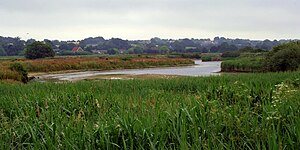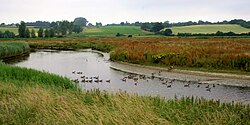Dedham Vale


Dedham Vale lies along the River Stour, which forms the border of Suffolk to the north with Essex to the south, and in particular the short stretch of the river's valley area between Manningtree and Smallbridge Farm, a mile east of Bures. It includes the village of Dedham in Essex, from which it takes its name.
The Vale is renowned for its beauty and the inspiration it has given to artists. (It is a designated 'Area of Outstanding Natural Beauty'). Dedham Vale comprises It is part of the area known since the artist's lifetime as Constable Country, as it was made famous by the paintings of John Constable. Among many other works of the area is his 1802 painting Dedham Vale in the Victoria and Albert Museum in London.[1]
Land use
Dedham Vale supports a viable and diverse agriculture with a mix of farm sizes. The majority of the land in the valley is still farmed despite development pressures. Farming is the primary tool for supporting the area's landscape and wildlife. In Arger Fen (designated a 'Site of Special Scientific Interest') are areas of ancient woodland, meadow and fen.[2]
Geology
Throughout the valley Eocene and glacial deposits overlay chalk deposited during the Cretaceous period. London Clay and sands are often exposed on the valley sides as the river and its tributaries cut through the deposits. The composition of these layers and where they occur is paramount in determining what species will grow, which habitats can occur and how the area is farmed.
River

The River Stour is the key landscape focus for the valley, its course is defined by bank-side trees and wet meadows. It supports a variety of riparian (river) habitats.
The valley floor has a large areas of functioning floodplain. Water quality is good, meeting levels demanded in regulations. The catchment meets sustainable demands for water supply, flood control and recreational use, whilst retaining an unspoilt character and healthy ecosystem.
The river has become an important method of controlling water levels both in the surrounding countryside and irrigating crops.
Human influence
Humans have had a great influence on the landscape including building isolated settlements, transport links and churches. Agricultural workers divided up the land to plant crops, grow timber and graze animals.
The landscape continues to change as changing agricultural practices, increased leisure time and an awareness of environmental concerns all contribute to development of the Stour valley.
Outside links
| ("Wikimedia Commons" has material about Dedham Vale) |
- Location map: 51°58’18"N, 0°56’45"E
- Dedham Vale Society
- Dedham Vale AONB and Stour Valley Countryside Project
- Constable's England - The Metropolitan Museum of Art
References
- ↑ "John Constable, Dedham Vale, Museum no. 124-1888". Victoria and Albert Museum. http://collections.vam.ac.uk/item/O69881/dedham-vale-oil-painting-constable-john-ra/. Retrieved 29 April 2014.
- ↑ SSSI listing and designation for Arger Fen